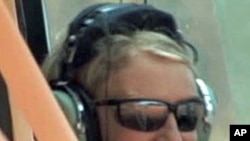On the black market, ivory commands more than $1,000 per kilogram, making poaching a persistent problem for African wildlife. But an American aerobatic pilot is trying to end the slaughter by training the pilots who patrol the skies over Africa. Based on interviews from the documentary film Over Africa, funded by the Lindbergh Foundation and produced by Miles O'Brien Productions, VOA's Carolyn Presutti tells us about Patty Wagstaff who is making a difference by helping her fellow pilots deal with difficult and life-threatening conditions.
Patty Wagstaff is a three-time aerobatic champion. She is an airshow superstar.
And she is a pilot trainer who is committed to saving wildlife in Africa. Wagstaff is the lead instructor for a group of wildlife pilots in Kenya.
"The pilots are good, basic pilots," said Patty Wagstaff. "But they just haven't had the training or the experience to not make the mistakes you make when you're not trained with precision and discipline."
Patty Wagstaff's pilots patrol vast plains, flying low to the ground at near-stall speed, looking for poachers.
"It's so sad what's happening," she said. "The poaching is getting worse. Aviation is becoming more important because it's been told by poachers that aviation is the single biggest deterrent to them. So what these pilots are doing is really important."
Red dust kicks up in the intense heat of the afternoon as the airplanes start their engines. Fuel is handpumped from drums. And any maintenance is basic. Every airplane has crashed at least once or has been shot at by poachers.
Wagstaff pulls up her khaki's above her knees and stoops to the ground brief fellow pilots. She draws directions in the red dirt of the airstrip.
The pilots gather every year for week-long clinics. The project is funded in part by The Charles A. and Anne Morrow Lindbergh Foundation, named after the famed American aviator Charles Lindbergh, who flew the first solo, non-stop flight across the Atlantic.
Patty Wagstaff says her special skills help to overcome objections to being taught by a woman.
"When it all comes down to it, we get up in the air and I can show them a few things," said Patty Wagstaff. "And if they give me any problems, I'll just flip them upside down, so."
Poaching decreases when these pilots are in the air. And their love of flying combines with their love of nature in this unique partnership.
George Mwangi is one of those pilots.
"When St. Peter comes and I eventually leave this world, I want I go to St. Peter and tell him I did my big job and took care of your animals - our animals," he said.
"We have this amazing resource, this global resource that you find in very few places in the world that's becoming more and more endangered - elephants, the rhino and everything else we fly over every day here and it belongs to everybody," said Wagstaff.




